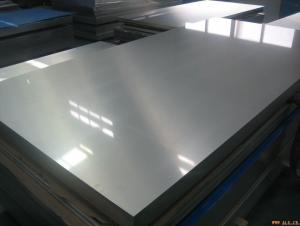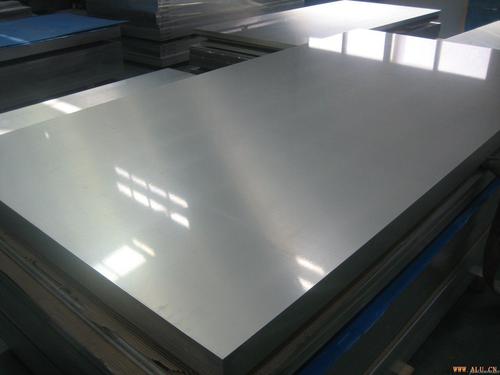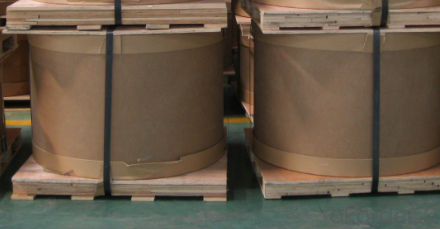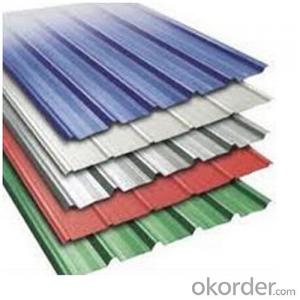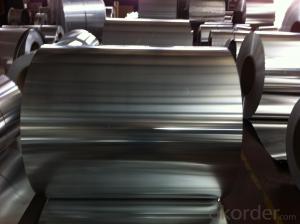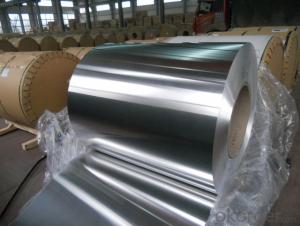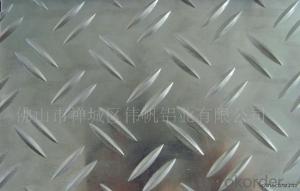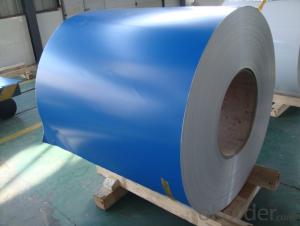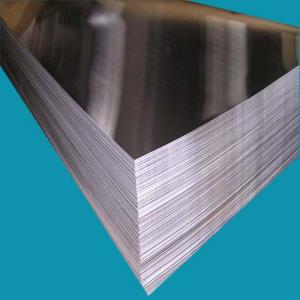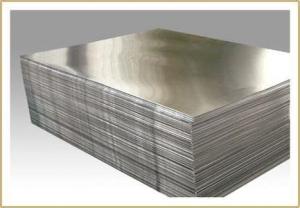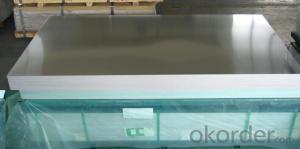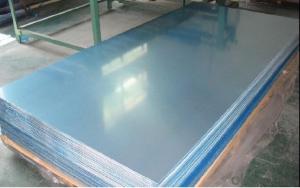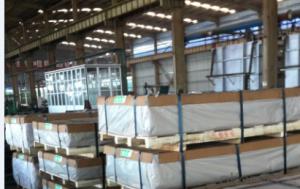Wholesale 1100 Aluminum Sheets - Aluminium Hot Rolled Alloy Plates Stocks with Best Price
- Loading Port:
- Shanghai
- Payment Terms:
- TT or LC
- Min Order Qty:
- 8 m.t.
- Supply Capability:
- 4000 m.t./month
OKorder Service Pledge
OKorder Financial Service
You Might Also Like
1.Structure of Product Description
Cold rolled aluminum sheet, hot rolled aluminum sheet, checkered sheet,
mirror finish aluminium sheet are widely used in the field of many different fields, etc.
te detailed grade are as follows: 1010, 1050,1060,1100, 2024, 3003, 3005,
3105, The temper is include H14, H22, H24, H44,H112,H114,etc.
2. Main features of the product
a.Competitive price
b.Frist-Class Service.
c. Shortest service.
3. Image.
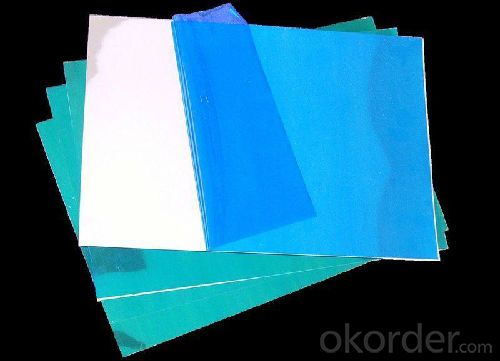
4. Product detailed sizes:
1000mm*2000mm, 1219mm*2438mm,1500mm*3000mm, etc.
5. FAQ:
What is the quality standard?
---Usually our standard is GB3880-2006 or others.
What is the width range?
What is the MOQ for your products yet?
Where is your client from?
---Normally it is from Japan, USA, ENGLISH, SINGAPORE, ETC.
What is your mainly products?
---Normally they are aluminum sheet, checkered sheet,
mirror finish aluminium sheet and the aluminium casting coil, etc.
- Q: What specific treatments or coatings are required for exterior applications to ensure durability and protection?
- <p>Yes, for exterior applications, special coatings or finishes are often necessary to protect against weathering, UV radiation, and other environmental factors. These may include weather-resistant paints, UV-resistant coatings, and corrosion-resistant finishes. For example, in construction, exterior walls might be treated with a water-repellent coating to prevent water damage, while metal structures may require anti-corrosion coatings to withstand harsh weather conditions. The choice of coating depends on the material, climate, and specific requirements of the application.</p>
- Q: 5083 what is the density of the aluminum plate?
- 5083 aluminum alloy is Al-Mg-Si, use a wide range, especially in the construction industry cannot do without this alloy, alloy is the most promising. The main alloying elements as magnesium, has good forming performance, corrosion resistance, weldability, moderate intensity, is a kind of pure aluminum alloy aluminum density: 2.71 tons. / m3 (g / cm3) alloy aluminum density: 2.8 tons / m3 (g / cm3) antirust aluminum density: 2.73 tons / m3 (g / cm3)
- Q: Can the aluminum sheets be used for soundproofing applications?
- Yes, aluminum sheets can be used for soundproofing applications. Aluminum is a lightweight and highly reflective material that can effectively block and absorb sound waves. When used in soundproofing applications, aluminum sheets can help reduce noise transmission and create a quieter environment. They can be installed as barriers, panels, or even as part of a composite material to enhance soundproofing properties. Additionally, aluminum sheets are durable, corrosion-resistant, and easy to maintain, making them suitable for long-term use in various soundproofing applications.
- Q: Could copper wire be welded with aluminum sheet?
- Copper wire could be welded with aluminum sheet, and it needs to use low temperature welding method, if copper wire is in the unit of millimeter and aluminum sheet is also in the unit below 1 mm, you can use electric soldering iron to heat it as hybrid welding and choose low temperature welding materials, you can use WEWELDING M51 welding wire and M51-F flux to complete welding. As for the large aluminum sheet, you can take liquefied gas multihole lance as heat source, then choose the same low temperature materials as welding materials, you can use WEWELDING M51 welding wire and M51-F flux to complete welding. Welding fundamentals of these two welding methods: both of them are use heatable heat source to heat the matrix to 179 degree, the melting point of WEWELDING M51, then use matrix’s heat conduction to melt welding wire, completing welding. The process of melting welding wire is the process of smearing the welding wire with flux into welding area, melting welding wire completely depends on matrix’s heat conduction.
- Q: Can aluminum sheets be anodized for corrosion protection?
- Aluminum sheets have the capacity to undergo anodization in order to safeguard against corrosion. Anodizing initiates an electrochemical reaction that generates a safeguarding oxide layer on the aluminum's surface. This protective oxide layer exhibits exceptional resistance against corrosion and provides a robust and enduring shield. Various aluminum products, including sheets, can be subjected to anodizing to elevate their resistance against corrosion, enhance their aesthetic appeal, and prolong their lifespan. The anodizing process entails immersing the aluminum sheet in an electrolyte solution and applying an electric current, enabling oxygen ions to bond with the metal's surface and establish the safeguarding oxide layer. Anodized aluminum sheets are extensively employed in vital industries such as aerospace, automotive, construction, and electronics, where corrosion resistance is of paramount importance.
- Q: Are aluminum sheets suitable for HVAC systems?
- Yes, aluminum sheets are suitable for HVAC systems. They possess excellent thermal conductivity, corrosion resistance, and durability, making them an ideal choice for constructing components such as ductwork, heat exchangers, and coils in HVAC systems.
- Q: Can aluminum sheets be used for chemical distillation columns?
- Yes, aluminum sheets can be used for chemical distillation columns, particularly for low temperature and non-corrosive processes. However, it is important to note that aluminum may not be suitable for high temperature or corrosive applications, as it can react with certain chemicals and corrode. In such cases, alternative materials like stainless steel or glass may be more appropriate.
- Q: Are aluminum sheets suitable for architectural louvers?
- Indeed, aluminum sheets prove to be a fitting option for architectural louvers. The advantageous properties of aluminum make it a favored material for louvers in the field of architecture. To begin with, aluminum possesses the desirable combination of being lightweight and yet sturdy, which makes it an ideal material for architectural louvers. It has the ability to withstand external forces such as wind and various weather conditions while maintaining its structural integrity. This becomes crucial for louvers as they are required to provide ventilation and airflow, all the while retaining their form and functionality. Furthermore, aluminum displays a high level of resistance against corrosion and rust. Considering that louvers are frequently exposed to outdoor elements like rain, moisture, and sunlight, the corrosion resistance of aluminum ensures the longevity and durability of the louvers, even in harsh environmental conditions. In addition, aluminum is an adaptable material that can be easily customized and fabricated into different shapes and sizes. This flexibility allows architects and designers to fashion louvers with unique designs and configurations that suit the specific requirements of the building. Aluminum louvers can be personalized to optimize airflow, control light, and enhance aesthetic appeal. Moreover, aluminum stands out as a sustainable and environmentally friendly material. It is widely recyclable, which means that aluminum louvers can be easily repurposed or reused at the end of their life cycle. Opting for aluminum in the construction of architectural louvers aligns with sustainable building practices and contributes to the overall reduction of environmental impact. In conclusion, aluminum sheets are indeed a suitable choice for architectural louvers. Their lightweight yet robust nature, resistance to corrosion, ability to be customized, and sustainability make them an excellent option in terms of functionality, durability, and aesthetics.
- Q: The furnace above is only hot enough to melt lead, but isn't hot enough to melt aluminum. I'm not looking for a blowtorch, or something too expensive or could melt gold, but just something that i can buy and is like the one above but isn't that expensive and can melt aluminum. Thanks!
- Aluminum melts below 1300F These gold and silver melters like the one in the link go to 2000F or more and should work for aluminum. I guess more small melters of metals want to melt gold and silver than aluminum.
- Q: Does it make any difference shiny side up, shiny side down when it comes to cooking with aluminum foil?
- With the shinny side up the heat is reflected away from the contents. With the Dull side out the heat is greater inside the pouch.
Send your message to us
Wholesale 1100 Aluminum Sheets - Aluminium Hot Rolled Alloy Plates Stocks with Best Price
- Loading Port:
- Shanghai
- Payment Terms:
- TT or LC
- Min Order Qty:
- 8 m.t.
- Supply Capability:
- 4000 m.t./month
OKorder Service Pledge
OKorder Financial Service
Similar products
Hot products
Hot Searches
Related keywords
